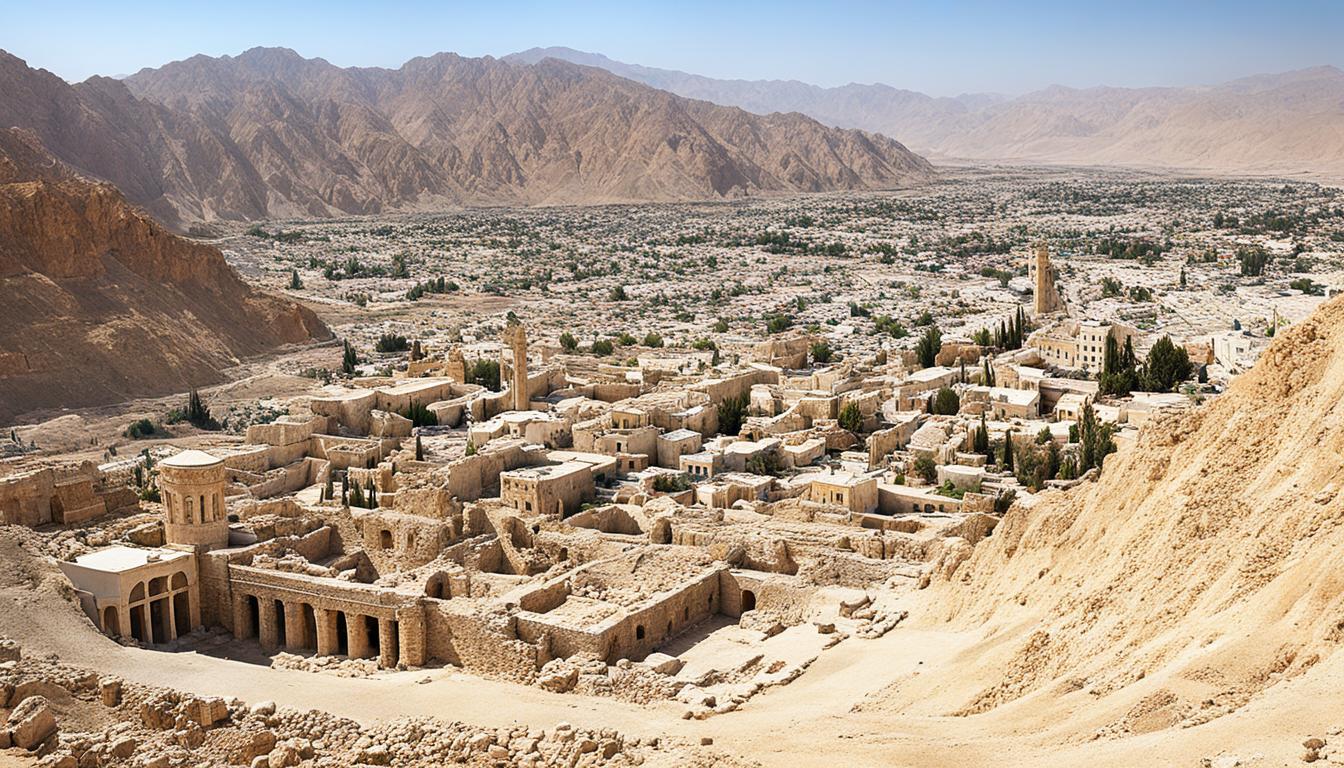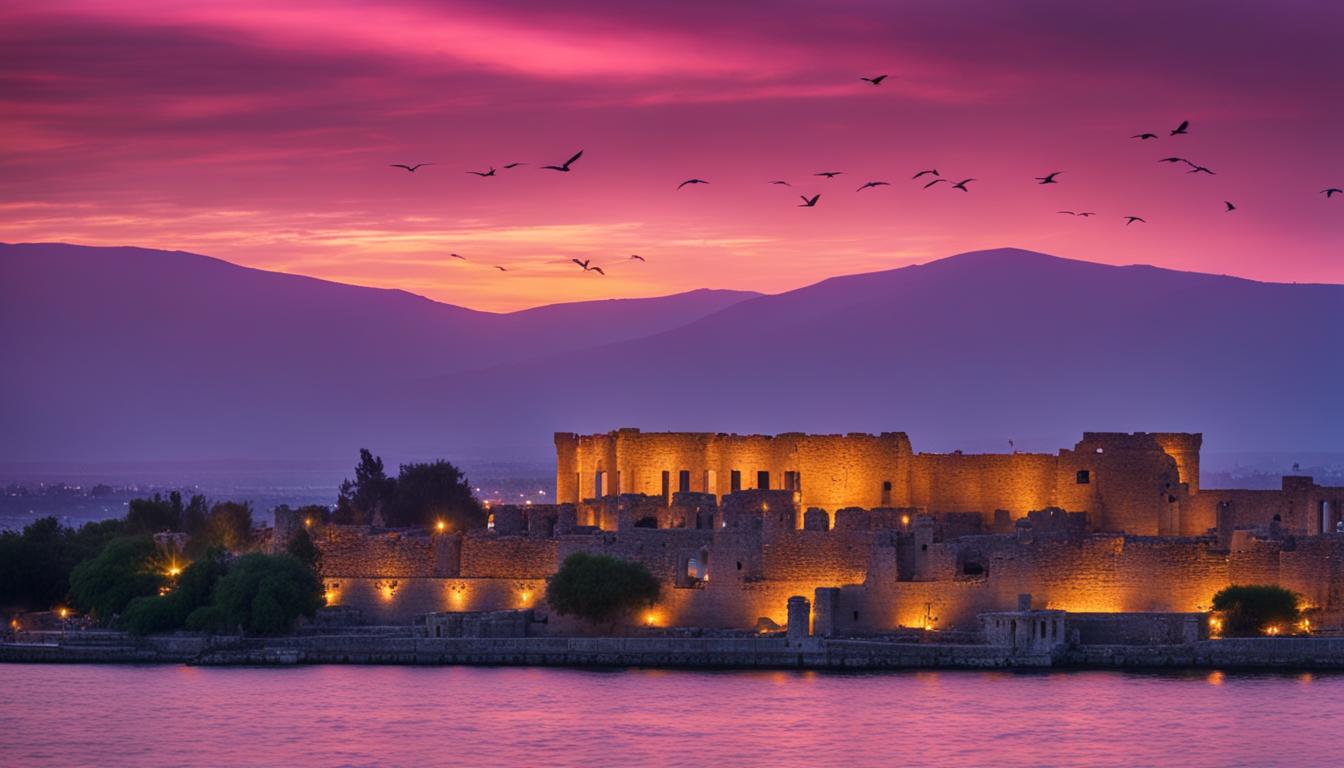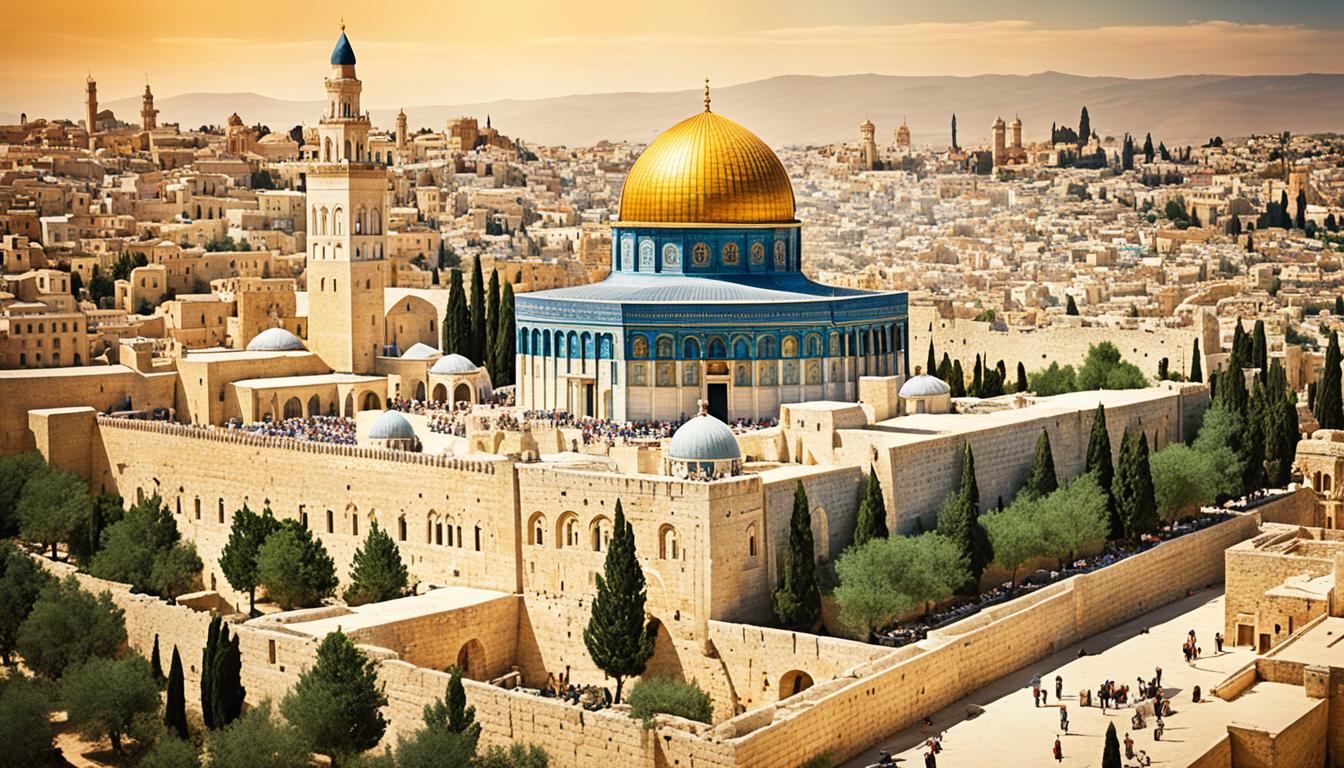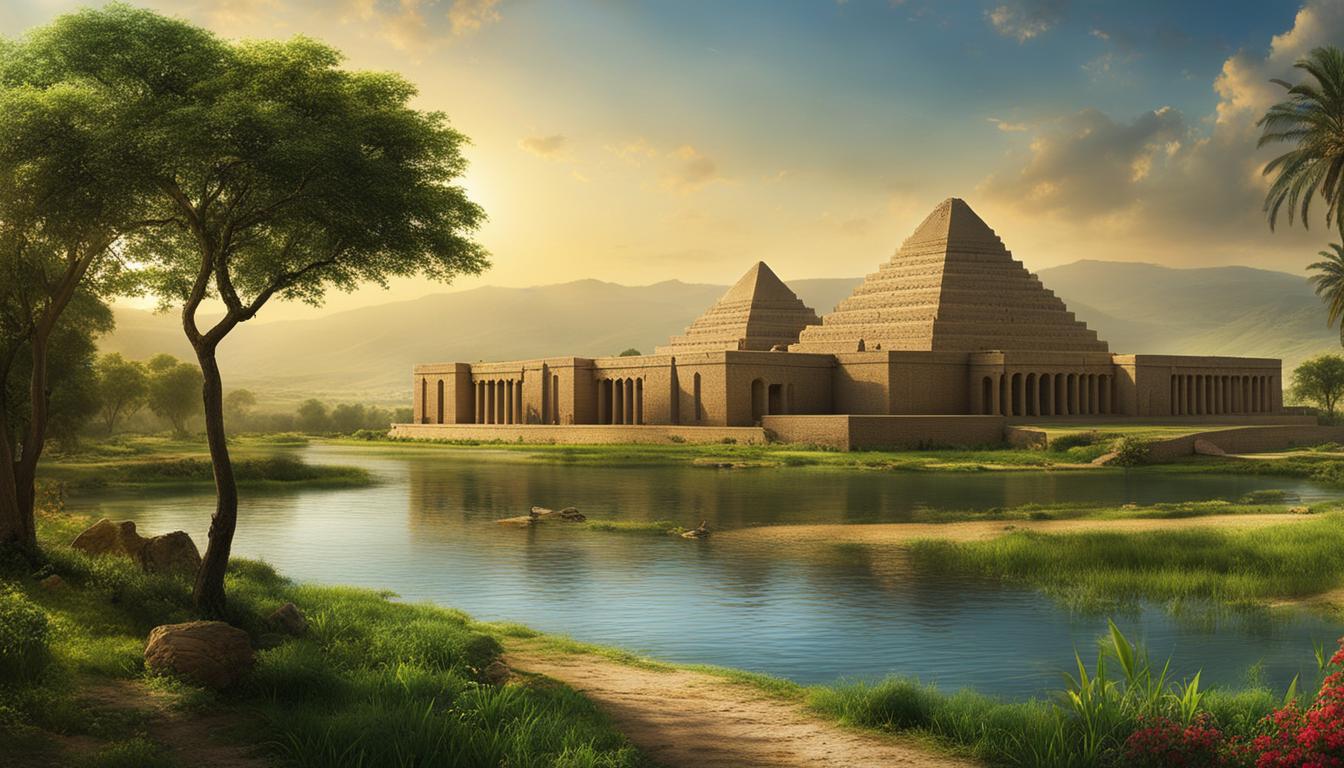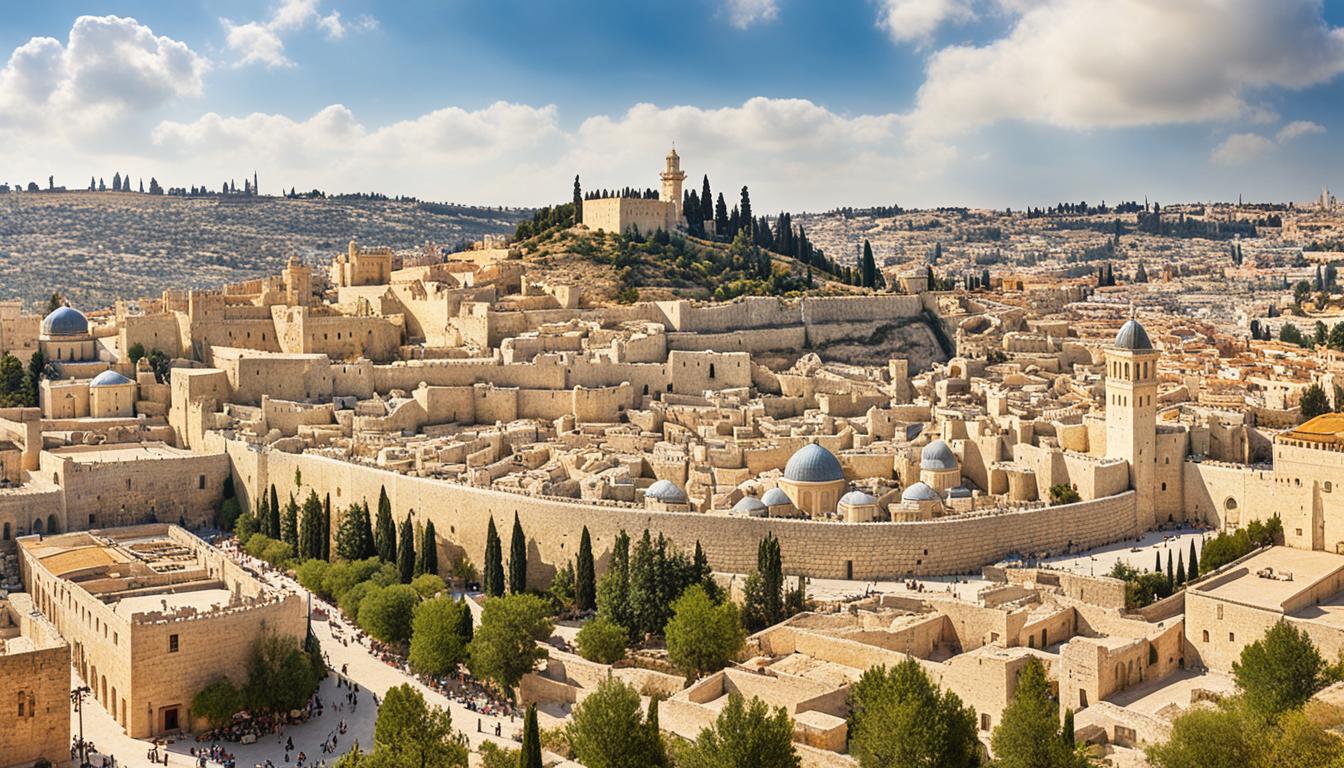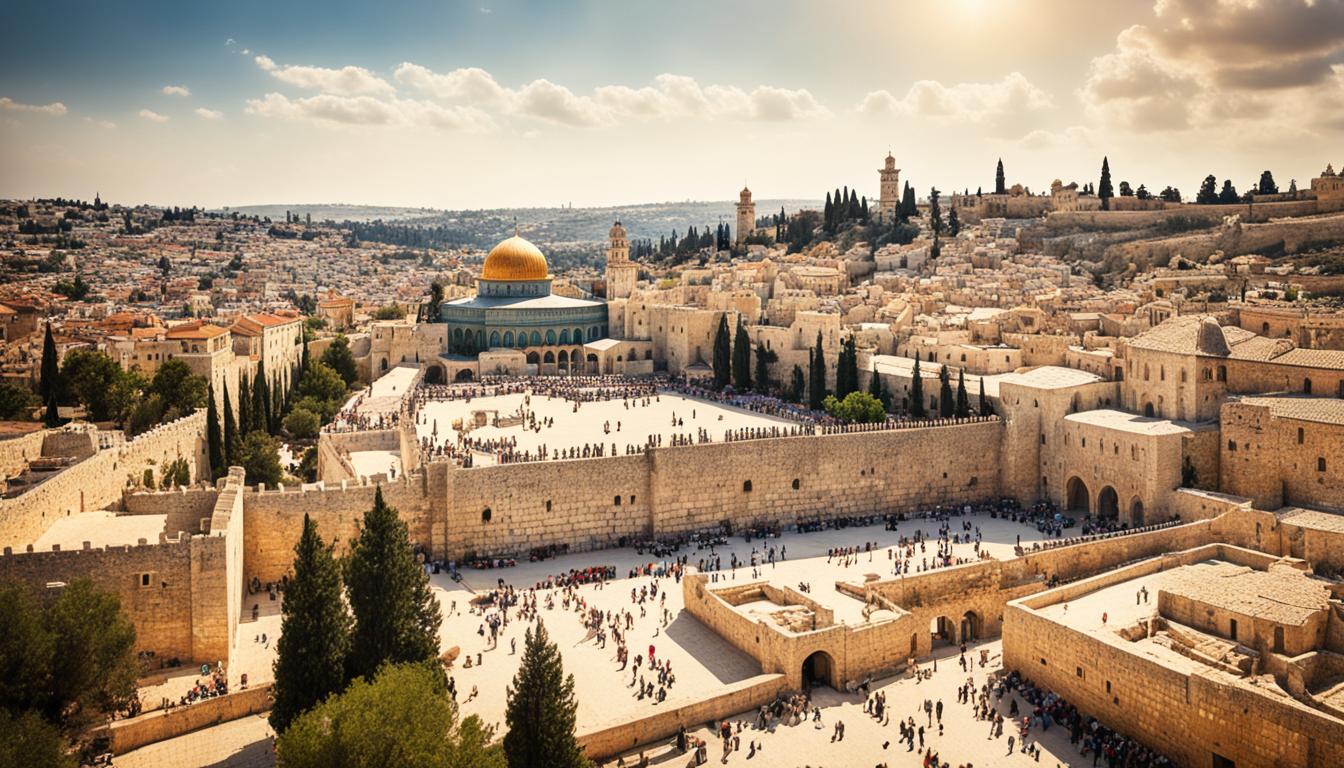The Bible mentions many cities that played significant roles in biblical history. From Capernaum, where Jesus began his ministry, to Jerusalem, the city of completion, and Jaffa, where Peter had a major revelation, these cities offer a glimpse into the ancient world and the stories that shaped civilization.
Key Takeaways:
- Biblical cities hold immense historical and religious significance.
- Capernaum served as a center for Jesus’ ministry and witnessed many of his miracles.
- Jerusalem played a pivotal role in Jesus’ mission and remains a holy city to this day.
- Jaffa was the city where Peter had a transformative experience in the spread of Christianity.
- Exploring these cities deepens our understanding of the biblical world and the impact of faith on civilization.
Capernaum – The City of Convergence
Capernaum, located on the northwestern shore of the Sea of Galilee, was a prominent city during biblical times. This historical city holds great significance in religious texts and played a central role in Jesus’ ministry.
Positioned strategically at the convergence of major trade routes, Capernaum became a bustling fishing town and a significant commercial center. Its location facilitated economic growth and cultural exchange, attracting people from various backgrounds.
Capernaum was not only a hub of trade but also a place where Jesus gathered his disciples and performed numerous miracles. It was in this city that he healed the paralyzed man lowered through the roof, and where he proclaimed, “I am the bread of life” (John 6:35). Capernaum witnessed firsthand the transformative power of Jesus’ teachings and acts of compassion.
“He left Nazareth and made his home in Capernaum by the lake, in the territory of Zebulun and Naphtali.” – Matthew 4:13
Today, the ruins of Capernaum stand as a testament to its historical significance. Visitors can explore the remains of the ancient synagogue and the house of Peter, providing a glimpse into the life and ministry of Jesus in this remarkable city.
| Key Features of Capernaum | Significance |
|---|---|
| Centrally located at the convergence of major trade routes | Strategic economic and cultural importance |
| Home to Jesus’ disciples | Witness to Jesus’ teachings and miracles |
| Remains of an ancient synagogue | Evidence of a vibrant community centered around faith |
| House of Peter | Significant historical and spiritual landmark |
Jerusalem – The City of Completion
Jerusalem, the capital of Israel, holds immense historical and religious significance in the Bible. It was in Jerusalem that Jesus completed his mission, offering salvation through his sacrifice on the cross. The city witnessed many pivotal events, including Jesus’ triumphal entry, his crucifixion, and his resurrection. Jerusalem remains a holy city for Christians, Jews, and Muslims alike.
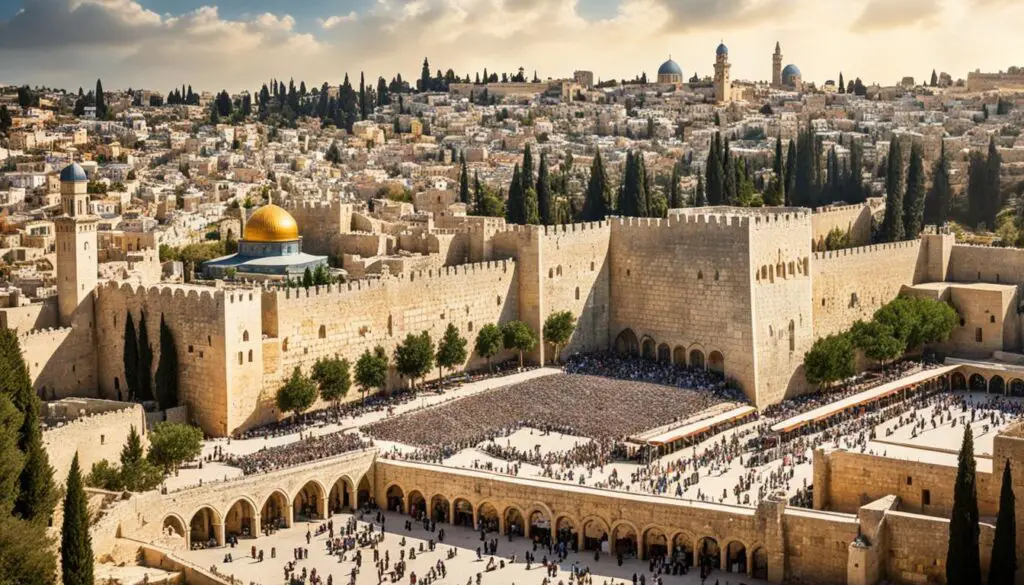
Jerusalem, often referred to as the “City of Peace,” is one of the most famous cities mentioned in the Bible. Its importance stems from its association with the life and ministry of Jesus, as well as its prominence in ancient biblical history. The city’s name itself carries significant weight, translating to “foundation of peace” in Hebrew.
In the New Testament, Jerusalem becomes the central stage for the climax of Jesus’ earthly journey. It was here that he made his triumphal entry into the city, hailed as the long-awaited messiah. The people laid palm branches before him, symbolizing his kingly status and their hope for liberation.
“Hosanna! Blessed is he who comes in the name of the Lord!” – Matthew 21:9 (ESV)
Within the walls of Jerusalem, Jesus engaged in intense debates with the religious authorities, overturned the tables of the money changers in the temple, and delivered powerful teachings that challenged the status quo. It was also in Jerusalem that Jesus celebrated the Last Supper with his disciples, instituting the practice of communion.
“Take, eat; this is my body.” – Matthew 26:26 (ESV)
The climax of Jesus’ ministry unfolded in Jerusalem, as he willingly embraced the cross for the redemption of humanity. Within the city’s walls, he endured great suffering, bearing the weight of sin and offering salvation through his sacrifice.
Three days later, Jerusalem became the site of Jesus’ resurrection, the event that solidified his victory over death and marked the ultimate completion of his mission. The empty tomb in Jerusalem’s garden became a testament to the power of faith and the hope of eternal life.
The Significance of Jerusalem
Jerusalem’s significance extends beyond the life of Jesus. Throughout biblical history, it served as a central hub for worship and spiritual encounters. The city housed the Ark of the Covenant during the reigns of David and Solomon, making it the religious center of the Israelite nation.
For Christians, Jerusalem remains a place of pilgrimage, drawing believers from around the world who seek to connect with the roots of their faith. The city’s iconic landmarks, such as the Western Wall, the Church of the Holy Sepulchre, and the Mount of Olives, serve as reminders of the profound biblical events that unfolded within its boundaries.
Furthermore, Jerusalem holds deep historical and cultural significance for Jews and Muslims. The Western Wall, believed to be a remnant of the Second Temple, is a sacred site for Jewish prayer and reflection. The Dome of the Rock and the Al-Aqsa Mosque stand as symbols of Islamic heritage and spiritual devotion.
Jerusalem’s lasting impact as a significant city in biblical history cannot be overstated. Its legacy continues to inspire and draw people from all walks of faith, offering glimpses into the profound stories that shape our understanding of God’s plan for humanity.
Jaffa – The City of Correction
Jaffa, also known as Joppa, holds a special place in biblical history. It was in Jaffa that Peter had a transformative experience and embraced the inclusion of the Gentiles in the message of Christ.
“About noon the following day as they were on their journey and approaching the city, Peter went up on the roof to pray. He became hungry and wanted something to eat, and while the meal was being prepared, he fell into a trance. He saw heaven opened and something like a large sheet being let down to earth by its four corners. It contained all kinds of four-footed animals, as well as reptiles and birds. Then a voice told him, ‘Get up, Peter. Kill and eat.’” – Acts 10:9-13 (NIV)
This vision that Peter had in Jaffa marked a significant shift in the early Christian movement. It was here that God used Jaffa to correct Peter’s understanding, revealing that the message of salvation and inclusion in Christ was not limited to the Jewish people but extended to the Gentiles as well.
This revelation opened the door for the spread of Christianity to the non-Jewish world, showcasing the universal nature of the gospel. Jaffa played a crucial role in bridging the gap between different cultures and expanding the reach of Christianity beyond its original boundaries.
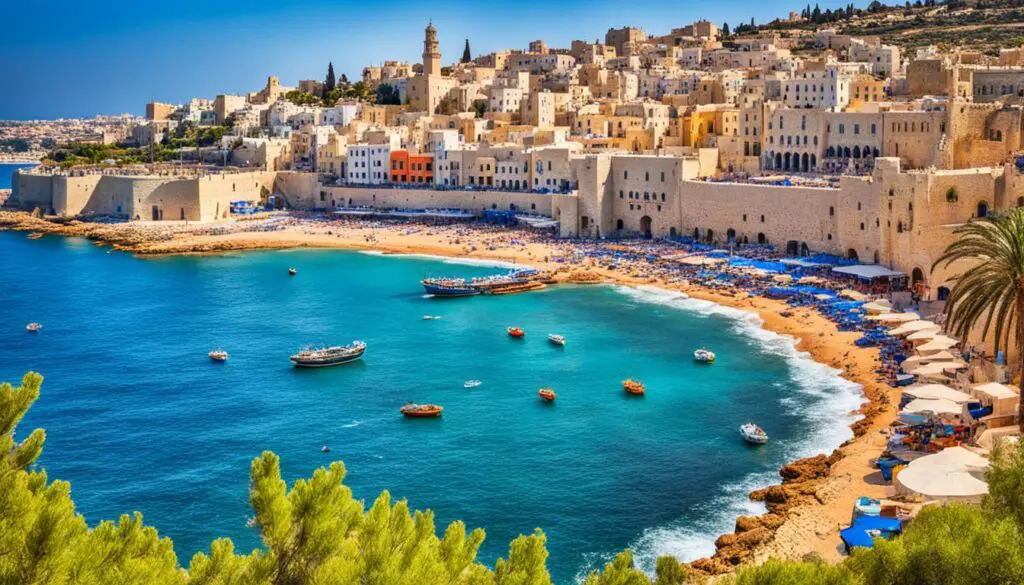
By embracing the correction he received in Jaffa, Peter became a pivotal figure in the early Christian movement, advocating for the acceptance and inclusion of all believers regardless of their cultural background.
Jaffa’s legacy as the city of correction serves as a reminder of the transformative power of understanding and embracing God’s inclusive love and grace.
Conclusions
The cities mentioned in the Bible provide a fascinating window into the rich history and cultural heritage of biblical times. Each city has its own unique story and significance, contributing to the larger narrative of God’s work among humanity.
Exploring these cities allows us to deepen our understanding of the biblical world and the profound impact of faith on civilization. From the historical city of Capernaum, witness to Jesus’ ministry, to the sacred city of Jerusalem, where Jesus completed his mission, and the transformative city of Jaffa, the Bible takes us on a journey through ancient cities and the stories that shaped them.
By immersing ourselves in the accounts of these ancient cities, we gain insight into the challenges, triumphs, and struggles of the people who lived during biblical times. The cities serve as a backdrop for the faith and devotion of individuals, the spread of Christianity, and the unfolding of God’s plan for salvation.
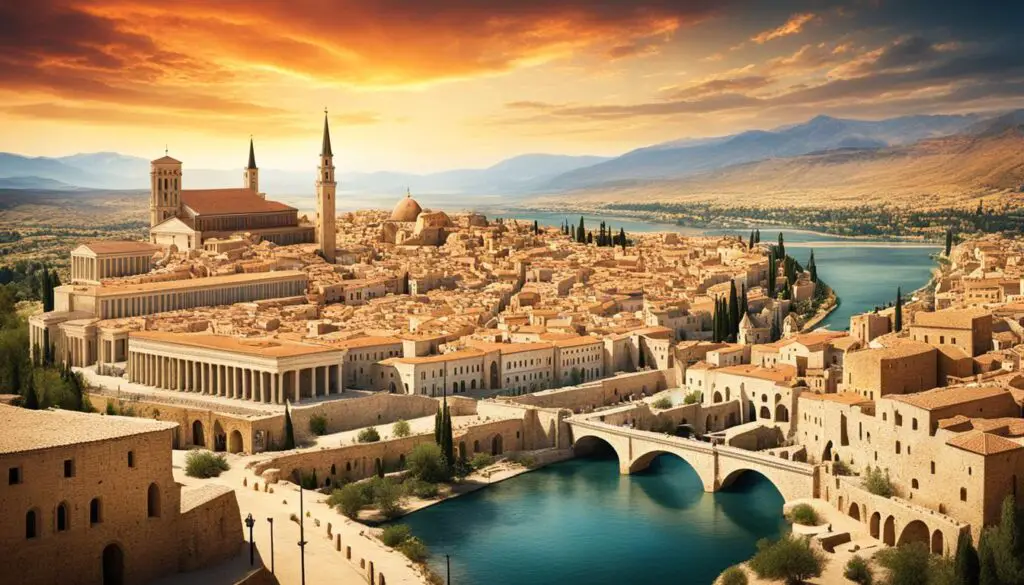
Through exploration and study, we can decipher the significance of biblical cities and their relevance to our lives today. Visiting these remarkable places, walking in the footsteps of biblical figures, and witnessing remnants of ancient civilizations provide a tangible connection to the past and a deeper appreciation for the historical context of the Bible.
“The cities mentioned in the Bible offer a glimpse into the rich history and cultural heritage of biblical times.”
Key Takeaways:
- Exploring biblical cities provides insights into the rich history and cultural heritage of biblical times.
- Each city mentioned in the Bible has its own unique story and significance.
- Studying these cities deepens our understanding of the biblical narrative and the impact of faith on civilization.
- Visiting these ancient cities allows us to connect with the past and appreciate the historical context of the Bible.
| City | Significance |
|---|---|
| Capernaum | Center of Jesus’ ministry and witness to many miracles |
| Jerusalem | Capital of Israel and the city of Jesus’ crucifixion and resurrection |
| Jaffa | City where Peter received a revelation and the gospel extended to the Gentiles |
Additional Cities in the Bible
In addition to the major cities mentioned above, the Bible contains references to many other cities. These include Sodom and Gomorrah, which were destroyed due to their wickedness; Bethlehem, the birthplace of Jesus; and Nineveh, the city where Jonah preached repentance. Each of these cities offers its own unique insights into the biblical narrative.
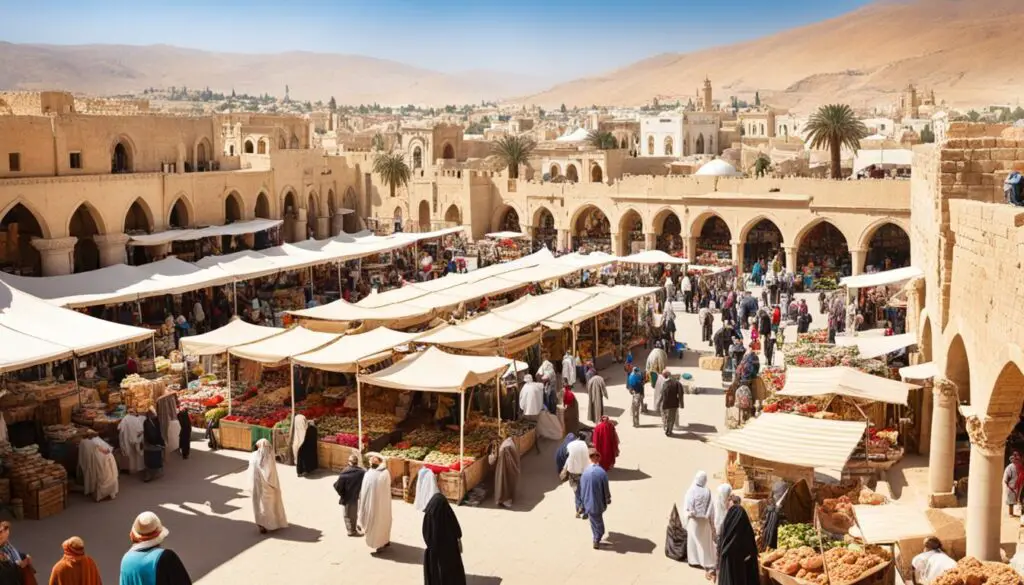
Notable Cities Mentioned in the Bible
- Sodom and Gomorrah – These cities were known for their rampant sin and immorality, ultimately leading to their destruction by fire and brimstone.
- Bethlehem – The city where Jesus was born, fulfilling the prophecy of the Messiah’s birthplace.
- Nineveh – The capital of the ancient Assyrian Empire, where the prophet Jonah preached a message of repentance, leading to the city’s repentance and salvation.
“And the Lord rained upon Sodom and upon Gomorrah brimstone and fire from the Lord out of heaven.” – Genesis 19:24
These cities, though not as prominent as Jerusalem or Capernaum, hold significant historical and theological importance. They serve as reminders of the consequences of sin, the fulfillment of prophecies, and the power of repentance.
City-Building in the Bible
The Bible provides fascinating insights into the practice of city-building, offering a glimpse into the ancient civilizations that shaped biblical history. From the pre-Flood city of Enoch to the post-Flood cities established by the descendants of Nimrod, urban development played a significant role in shaping societies.
Enoch was one of the earliest cities mentioned in the Bible. It was founded by Cain and named after his son. Although not much is known about Enoch, its existence indicates that city-building was prevalent even in the earliest times.
Following the Great Flood, the descendants of Noah embarked on a journey of city-building, spearheaded by Nimrod, the great-grandson of Noah. The Bible mentions several cities established by Nimrod, including Babel, Erech, and Nineveh. These cities served as centers of power, culture, and trade, leaving a lasting impact on the biblical narrative.
“And the beginning of his kingdom was Babel, Erech, Accad, and Calneh, in the land of Shinar.”
Genesis 10:10 (NKJV)
The establishment of these cities showcased the importance of urban centers in the ancient world. They provided fertile ground for the growth of civilizations, fostering social, economic, and cultural development. These cities were not just physical structures but also shaped the beliefs, ideologies, and practices of the people who dwelled within their walls.
City-building in biblical times was not only about erecting structures; it was a process influenced by political, religious, and economic factors. It involved planning, infrastructure development, and the creation of social and legal frameworks to govern the city and its inhabitants.
The Importance of Urban Centers
Biblical city-building reflects the significance of urban centers in the shaping of societies. These cities served as hubs for trade, governance, and religious activities. They facilitated social interactions, cultural exchanges, and the spread of ideas among diverse communities.
Urban centers were often fortified with walls and gates, providing protection against external threats. These fortified cities ensured the safety of their inhabitants and became symbols of strength and security in biblical times.
The biblical narrative also highlights the establishment of cities of refuge, designated places where individuals who unintentionally caused harm could find safety and protection from retribution.
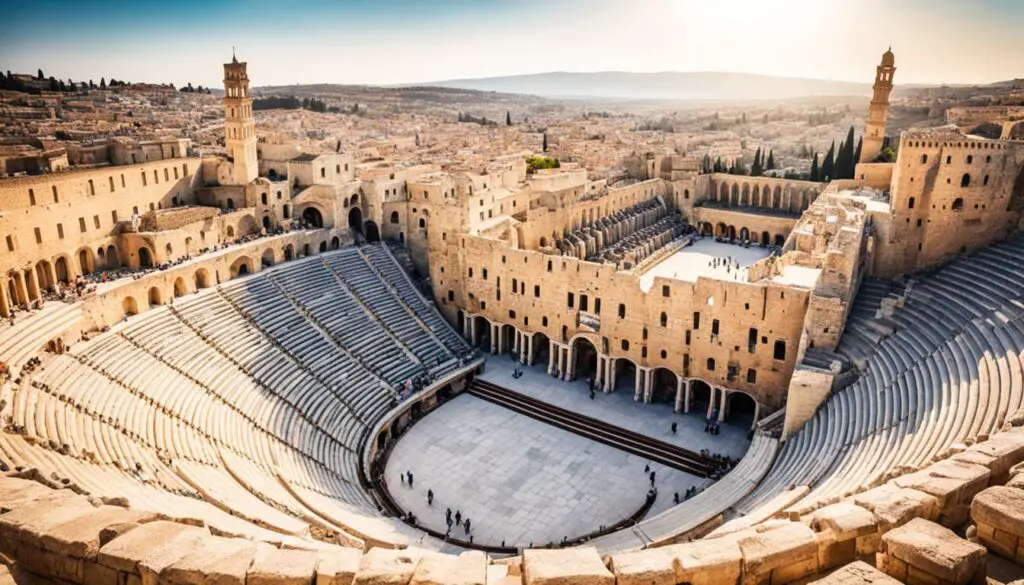
As we explore the cities mentioned in the Bible, we gain a deeper understanding of the historical, cultural, and spiritual significance they held in biblical times. Each city tells a unique story of human achievement, faith, and societal development.
Famous Cities Built in Biblical Times
| City | Founder | Significance |
|---|---|---|
| Babel | Nimrod | A symbol of human rebellion against God |
| Erech | Nimrod | A center of trade and commerce |
| Nineveh | Nimrod | The capital of the mighty Assyrian Empire |
These cities, like many others, remain as testaments to the determination and ingenuity of early civilizations, leaving lasting imprints on the tapestry of human history.
Fenced Cities and Cities of Refuge
In biblical times, the establishment of fenced cities played a crucial role in ensuring the security and safety of their inhabitants. These cities were fortified with walls and other defenses, offering protection against external threats. The Bible often mentions these fenced cities as essential hubs of civilization, where people could live securely and peacefully.
One notable concept related to urban safety in biblical times is that of cities of refuge. These were designated cities where individuals who accidentally caused harm could seek shelter and protection from those seeking retribution. These cities served as sanctuaries, ensuring fair treatment and preventing the cycle of violence from spiraling out of control.
The establishment of cities of refuge reflected the importance placed on justice and mercy in biblical law. They provided a space for individuals involved in accidental harm to find refuge and receive a fair hearing. By designating these cities, biblical society sought to prevent bloodshed, promote reconciliation, and uphold the principles of justice and compassion.
It is fascinating to explore the biblical narratives surrounding fenced cities and cities of refuge. These stories reveal the complexity of ancient urban planning and the intricate social and legal systems that enabled the functioning of these cities. They also highlight the importance of providing refuge and protection for all members of society, regardless of their circumstances.
The tables below showcase a few examples of fenced cities and cities of refuge mentioned in the Bible:
| Fenced Cities | Location | Purpose |
|---|---|---|
| Jerusalem | Israel | Capital city and spiritual center |
| Jericho | Israel | Strategic military outpost |
| Hebron | Israel | City of the patriarchs |
| Cities of Refuge | Location | Purpose |
|---|---|---|
| Kedesh | Israel | Protect those accused of unintentional manslaughter |
| Shechem | Israel | Provide sanctuary for those seeking refuge |
| Bezer | Israel | Offer a place of safety for the innocent |
Historic City Names in the Bible
The Bible is a treasure trove of historical city names that transport us to ancient times. Each city mentioned holds significance and played a unique role in the unfolding of biblical history. Let’s explore some of these remarkable cities and the stories they tell.
Jerusalem
“Jerusalem, the city of peace, has deep roots in biblical history. It served as the capital of Israel and the center of worship, hosting the magnificent Temple. Jerusalem witnessed significant events, including Jesus’ last supper, crucifixion, and resurrection.”
Babylon
Babylon, a mighty and prosperous city, holds a prominent place in biblical narratives. It was the capital of the Babylonian Empire and the setting for the exile of the Israelites. The fall of Babylon marked a pivotal moment in history where God’s judgment brought an end to its splendor.
Jericho
“Jericho, known for its fortified walls, witnessed the miraculous victory of the Israelites. Following God’s instructions, the Israelites marched around the city and, on the seventh day, the walls collapsed. Jericho serves as a testament to the power of faith and obedience.”
Bethel
Bethel, meaning “House of God,” was a place of spiritual significance in biblical times. It was here that Jacob had his vision of a ladder reaching heaven, confirming the presence of God. Bethel symbolizes the connection between earth and heaven, reminding us that God’s presence is with us wherever we go.
Sodom and Gomorrah
“Sodom and Gomorrah, infamous for their wickedness, serve as a stark reminder of God’s judgment. These cities were destroyed by fire and brimstone as a demonstration of God’s righteousness and intolerance for sin.”
These are just a few examples of the many historic city names in the Bible. Each name carries a story and offers insights into the cultural context and spiritual journey of ancient civilizations. Exploring these city names deepens our understanding of the biblical narrative and the people who played key roles in shaping history.
The Influence of Cities in the Bible
Cities played a significant role in biblical history, serving as centers of power, worship, and cultural exchange. These ancient urban centers were not just geographical locations but vibrant hubs where important events unfolded. They provided the backdrop for the development of faith and the spread of Christianity, shaping the social and historical context of the biblical narrative.
Throughout the Bible, prominent cities like Jerusalem, Capernaum, and Jaffa played pivotal roles in the lives of biblical figures. Jerusalem, the capital of Israel, was the city where Jesus completed his mission, offering salvation through his sacrifice. Capernaum, strategically located on the Sea of Galilee, witnessed Jesus’ ministry and miracles, leaving a lasting impact on biblical history. Jaffa, a significant coastal city, was the place where Peter had a profound revelation that transformed his understanding of the faith.
The stories and teachings associated with these cities, among others, helped shape the beliefs and practices of early Christians. They provided a platform for cultural exchange and the spread of the Christian message, leaving a lasting legacy that continues to influence faith communities today. Understanding the influence of cities in the Bible allows us to delve deeper into the rich tapestry of biblical history, providing insights into the social, religious, and historical dynamics of ancient civilizations.
FAQ
What are some major cities mentioned in the Bible?
Capernaum, Jerusalem, and Jaffa are among the major cities mentioned in the Bible.
Where is Capernaum located?
Capernaum is located on the northwestern shore of the Sea of Galilee.
What was the significance of Capernaum in biblical times?
Capernaum served as a center for Jesus’ ministry and was home to his disciples. It witnessed many of his miracles and played a crucial role in biblical history.
What is the historical and religious significance of Jerusalem?
Jerusalem is the capital of Israel and holds immense historical and religious significance in the Bible. It was where Jesus completed his mission, offering salvation through his sacrifice on the cross.
What events took place in Jerusalem?
Jerusalem witnessed many pivotal events in the Bible, including Jesus’ triumphal entry, crucifixion, and resurrection.
What is the significance of Jaffa in biblical history?
Jaffa, also known as Joppa, played a significant role in biblical history. It was in Jaffa that Peter had a transformative experience and embraced the inclusion of the Gentiles in the message of Christ.
What are some other cities mentioned in the Bible?
Sodom, Gomorrah, Bethlehem, and Nineveh are among the many other cities mentioned in the Bible.
What is the significance of city-building in the Bible?
The Bible describes various cities and their construction, showcasing the importance of urban centers in shaping ancient civilizations.
What were fenced cities and cities of refuge in biblical times?
Fenced cities were cities protected by fortifications and walls, providing security for their inhabitants. Cities of refuge were designated places where individuals who accidentally caused harm could seek protection and avoid retribution.
What are some famous historic city names mentioned in the Bible?
Jerusalem, Babylon, Jericho, and Bethel are among the famous historic city names mentioned in the Bible.
How did cities influence the biblical narrative?
Cities played a significant role in the Bible, serving as centers of power, worship, and cultural exchange. They were the settings for important events and the backdrop for the development of faith and the spread of Christianity.
